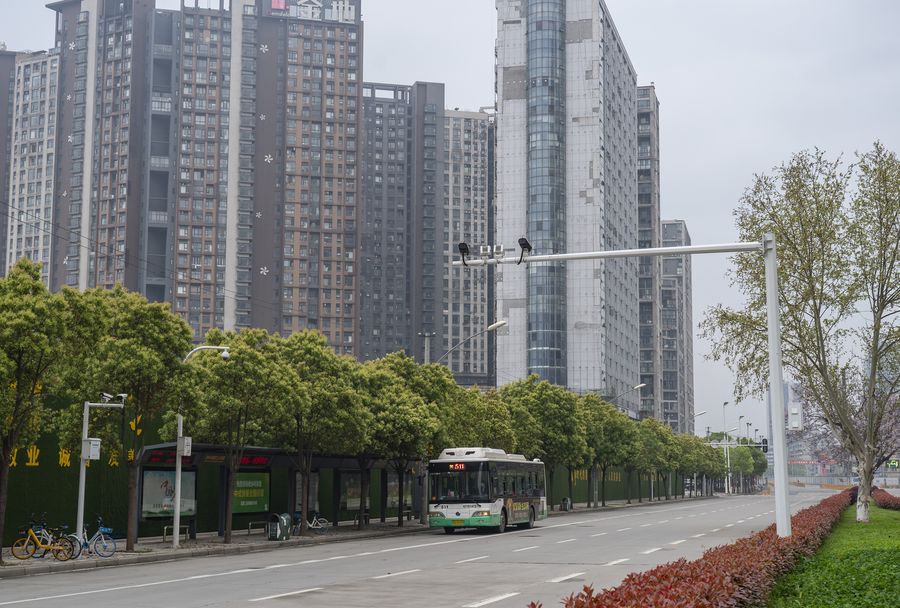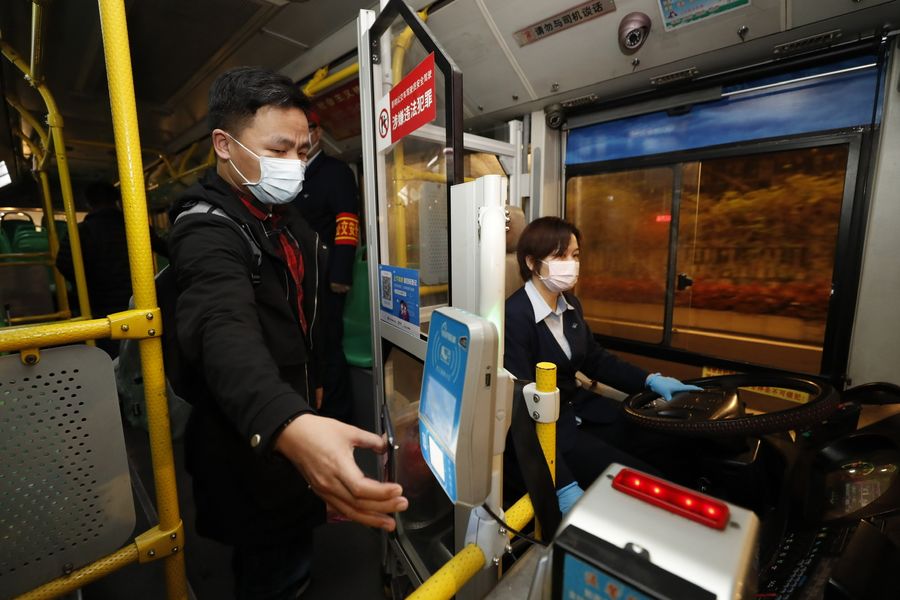
A bus runs on a road in Wuhan, central China's Hubei Province, March 25, 2020. (Xinhua/Cai Yang)
Wuhan resumed a total of 117 bus routes starting Wednesday, around 30 percent of the city's total bus transport capacity, the municipal transport bureau said.
WUHAN, March 25 (Xinhua) -- As a bus left its departure station at Hankou Railway Station at 5:25 a.m. on Wednesday, Wuhan started to resume bus service after nine weeks of lockdown.
Wuhan, the capital of central China's Hubei Province which was once hit hard by COVID-19 outbreak, resumed a total of 117 bus routes starting Wednesday, around 30 percent of the city's total bus transport capacity, the municipal transport bureau said.
Apart from a driver, a safety supervisor was also on each bus, whose duty was to make sure all passengers scan a QR code using their mobile phones to certify their health status before boarding.
"For those who do not have health codes, they should bring with them a health certificate issued by their residential community," said Zhou Jingjing, a safety supervisor aboard a bus departing from Wuchang Railway Station complex.
The bus drivers and safety supervisors should be screened for fever every day, wear masks and gloves during the trip, open windows for ventilation and disinfect the buses after each trip.
Zhou said all passengers must wear masks and sit apart from one another to reduce the risk of cross-infection.
Bus passenger Shao Xuefen, a supermarket worker in Wuhan, spent around three hours commuting to work by bike every day since the supermarket resumed business on March 10.
"I am excited that the bus service has been resumed. It helps a lot. I hope more bus routes can return to normal," Shao said.
Having worked for 12 years as a bus driver, Zhou hopes to get back to the driver's seat soon. "I'm looking forward to the day when the epidemic is over and life in Wuhan returns to normal," she said.
From Saturday, six metro lines are expected to reopen to the public in Wuhan. The service time will be published at the stations, the municipal transport bureau said.

A passenger pays the ticket fare with a mobile phone on a bus in Wuhan, central China's Hubei Province, March 25, 2020. (Xinhua/Shen Bohan)
According to a spokesperson of the bureau, passengers must wear masks, have their temperatures checked, register with their real names and scan a QR code before taking buses and subways. To minimize the infection risk, people who are vulnerable to the virus including those aged above 65 are not recommended to take public transportation.
On Jan. 23, Wuhan declared unprecedented traffic restrictions, including suspending the city's public transport and all outbound flights and trains, in an attempt to block the spread of the epidemic to other areas. Similar restrictions were soon introduced in other areas in Hubei.
As the virus outbreak continues to subdue in Hubei, the province is bracing for more reviving activities.
No new confirmed COVID-19 cases were reported Tuesday in Wuhan. The health commission of Hubei said Wednesday the total confirmed cases of COVID-19 in Wuhan and Hubei remained at 50,006 and 67,801 by Tuesday.
Hubei provincial authorities ended restrictions on outbound traffic starting Wednesday, with the exception of Wuhan, which is expected to lift outbound travel restrictions on April 8, according to a provincial government notice issued Tuesday.
The first batch of over 800 people stranded in Hubei Province arrived in Beijing Wednesday, with the transport of the people carried out in a well-organized and spot-to-spot way, said Chen Bei, deputy secretary-general of the Beijing municipal government, at a press conference.
At Hubei's Huangshibei Railway Station, the first train resumed operation was G2045 from central Chinese city of Zhengzhou to the eastern Chinese city of Xiamen, with more than 100 people boarding the train from the station at 11:11 a.m., according to Feng Yulin, Party secretary of the station that had been closed since Jan. 24.
"Today, a total of eight trains passed through the station that welcomed about 1,000 passengers, and the number is expected to hit around 2,000 tomorrow," Feng said. "I feel relieved to see the operation gradually return to normal."
For the safety of passengers, the station has invited a professional team to conduct comprehensive disinfection of platforms, elevators, toilets and other areas, according to Feng.
All outbound interprovincial-level highways will open by Friday to allow passengers to leave Hubei, except for Wuhan, said the provincial department of public security Wednesday.
After more than 10 hours drive, Cheng Peng, starting from Hubei's Macheng, arrived in the southern Chinese city of Shenzhen this afternoon, where he worked for a science and technology enterprise. The 28-year old said he returned to Hubei for the Spring Festival holiday but was stranded in his hometown for over two months due to the virus outbreak.
"After entering the highway, I was checked the body temperature for four times and showed my health code at different service stations and the traffic police checkpoints," Peng said.
According to him, there was little traffic in Hubei, probably because the restrictions have just been lifted.
Cheng said staying at home for more than two months, he "can't wait to start working."
"Life is too short. We should cherish every day and everyone we love," he said. ■



